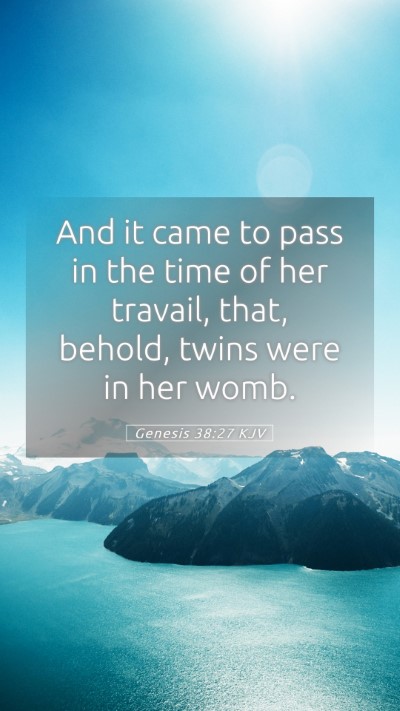Understanding Genesis 38:27
Bible Verse (Genesis 38:27): "And it came to pass, when the time of her travail came, that behold, twins were in her womb." This verse marks a significant moment in the narrative of Judah and Tamar, illustrating the unfolding of God’s providential plan.
Overview of Genesis 38
The chapter presents the story of Judah and Tamar, highlighting themes of justice, responsibility, and God's overarching plan in human affairs. It also underscores the importance of lineage in the biblical narrative.
Commentary Insights
- Matthew Henry: Henry emphasizes the moral lessons derived from Tamar's story, particularly the consequences of Judah's failure to fulfill his familial duties. He notes the significance of the twins, perceiving it as a symbol of God's blessing amidst dysfunction.
- Albert Barnes: Barnes points out that the birth of twins signifies both a physical and spiritual duality within Israel's lineage. He interprets this as an early indication of the complexities in human affairs and God's redemptive plan through unexpected means.
- Adam Clarke: Clarke provides a detailed examination of the cultural context surrounding the events, interpreting Tamar's action as a desperate yet justified move to secure her family's legacy. He draws attention to the feudal complexities of the Levirate marriage system.
Key Themes
- Divine Providence: The birth of twins amidst human folly reflects the sovereignty of God and His ability to work through imperfect situations.
- Familial Responsibility: Judah's neglect of his duties serves as a cautionary tale about the repercussions of failing to uphold familial obligations.
- Redemption and Hope: This narrative illustrates that even in morally ambiguous circumstances, God can bring forth redeeming outcomes.
Historical Context
Understanding the historical context is crucial for interpreting Genesis 38:27. The story takes place during a time when lineage and family ties were paramount, particularly in preserving the tribal economy of Israel. The Levirate marriage, which is central to this passage, required a brother to marry his deceased brother's widow to produce offspring in his name, highlighting the social and religious obligations of the time.
Application in Contemporary Life
Genesis 38:27 encourages reflection on personal responsibility and the significance of family commitments. It challenges readers to consider how they respond to moral dilemmas and the importance of upholding justice and integrity in their relationships.
Related Bible Cross References
- Genesis 38:1-10: The preceding verses provide the background of Judah's actions leading to the situation with Tamar.
- Deuteronomy 25:5-10: This passage outlines the laws concerning Levirate marriage, offering a deeper understanding of Tamar’s circumstances.
- Matthew 1:3: The genealogy of Jesus includes Tamar, showcasing the significance of this story in the broader narrative of redemption.
Conclusion
Genesis 38:27 serves as a profound reminder of the complexities of human life and the unfathomable ways in which God works through it. The unfolding events teach about responsibility, moral choices, and God's providential care for His people, making it essential for every believer to explore its meaning deeply.
For those engaging in Bible study, whether through online Bible study tools or Bible study groups, reflecting on such passages enhances our understanding of Bible verse meanings and Bible verse explanations. It nurtures a deeper appreciation of Scripture analysis and the role of narratives in conveying important theological truths.


